
- Queenstown Airport Travel Information
- Maps & Visitor Guide
- Autumn in Queenstown Winter in Queenstown Spring in Queenstown Summer in Queenstown Weather & Forecast
- Arrowtown, New Zealand Gibbston, New Zealand Glenorchy, New Zealand Kingston, New Zealand Fiordland, New Zealand Wanaka, New Zealand Central Otago, New Zealand
- Itineraries
- What to Pack
- Travel Tips
- Regenerative Travel
- Visitor Services Transport Services Wellness & Beauty Event Services Business & Professional Services
- Accessible Activities Accessible Accommodation Accessible Eateries
- Air Adventures Bungy, Swing & Zip Land Adventures Water Adventures Indoor Thrills
- Culture & Heritage
- Submit an Event
- Fishing & Hunting Mountaineering & Climbing Nature & Wildlife Skiing & Snowboarding Walking & Hiking Water Sports
- Scenic Cruises Scenic Flights Scenic Tours Scenic Attractions Movie Location Tours
- Skiing & Snowboarding
- Walking & Hiking
- Spa & Massage Yoga Hot Pools Gyms & Pilates Hair, Makeup & Beauty Physiotherapy
- Wineries & Breweries
- Backpackers & Hostels
- Bed & Breakfasts
- Holiday Parks & Camping Grounds
- Holiday Rentals
- Hotels & Resorts
- Lodges & Retreats
- Serviced Apartments
- Cafés & Bakeries
- Dessert & Ice Cream Shops
- Pubs, Bars & Clubs
- Restaurants
- Takeaways & Fast Food
- Wineries & Cellar Doors
- Brewery & Craft Beer Tours
- Queenstown Airport
- Travel Information
- Autumn in Queenstown
- Winter in Queenstown
- Spring in Queenstown
- Summer in Queenstown
- Weather & Forecast
- See & Do in Arrowtown
- Stay in Arrowtown
- Eat & Drink in Arrowtown
- Shopping in Arrowtown
- Gibbston, New Zealand
- Things to Do in Glenorchy
- Stay in Glenorchy
- Eat & Drink in Glenorchy
- Stay in Kingston
- See & Do in Kingston
- See & Do in Fiordland
- Wanaka, New Zealand
- Central Otago, New Zealand
- Information Centres
- Coach & Bus Services
- Rental Cars
- Taxis & Shuttles
- Limousines & Luxury Transport
- Campervans & Motorhomes
- Wellness & Beauty
- AV & Equipment Hire
- Event Management
- Team Building
- Bands & Entertainment
- Accountants & Law Firms
- Employment Agencies
- Creative Services
- Real Estate
- Print Services
- Local Services
- Accessible Activities
- Accessible Accommodation
- Accessible Eateries
- Air Adventures
- Bungy, Swing & Zip
- Land Adventures
- Jet Boating
- Indoor Thrills
- Fishing & Hunting
- Mountaineering & Climbing
- Nature & Wildlife
- Guided Walks & Hikes
- Hiking Equipment Hire
- Track Transport
- Short Walks in Queenstown
- Day Walks & Hikes in Queenstown
- Water Sports
- Scenic Cruises
- Airplane Flights
- Helicopter Flights
- Hot Air Ballooning
- Off Road Tours
- City & Region Tours
- Quad Biking & Buggy Tours
- Horse Riding
- Motorcycle Tours
- Scenic Attractions
- Movie Location Tours
- Spa & Massage
- Gyms & Pilates
- Hair, Makeup & Beauty
- Physiotherapy

Lake Hayes in Autumn
Why these locals have chosen to call queenstown home.
Discover life in Queenstown through the lens of our locals. Learn why this is the place they have chosen to settle and what makes our community unique.
Nestled on the crystal-clear Lake Whakatipu shores and flanked by the majestic peaks of the Southern Alps, it’s no wonder Queenstown has become a popular holiday destination for many. The number of people who call the lively region “home” is also growing. But what is it about this picturesque New Zealand South Island town that convinces people to settle down?
Beyond the stunning landscapes and adrenaline-pumping adventures, there's a community spirit and quality of life here that's hard to find elsewhere. In this article, we dive into the hearts and minds of the locals to uncover why they choose to live and work in Queenstown.
A deep sense of community
Queenstown is more than just its postcard-perfect scenery; it's the people who make this place vibrant and full of life.
“Queenstown is home... it’s almost like it wraps itself around you. I’m so fortunate to get to meet incredible people here every day,” explained Frances Piacun , who is the Founder of Artbay Gallery and Waka Ama. When Frances moved to Queenstown in 2014, she was training to go to the Waka Ama, a traditional Pacific outrigger canoe, world championships in Rio de Janeiro. But there were no waka (canoes) in Queenstown. So, she established the Whakatipu Waka Ama Club, and began coaching a local crew.
Queenstown is a town where everyone knows your name, and the support among locals creates a warm and welcoming atmosphere that enchants everyone who visits.
“I came here with every intention of just doing a couple of ski seasons. But I quickly discovered that wasn’t happening… so we've built our life here, and all our friends are here,” told Charlotte who came over to work in ski patrol, and then met her long time partner, Sam. Charlotte first met Sam on the mountain in 2018, when she was a lift operator and he was a ski patroller. Now they are a ski patrolling couple.
These are just some of the many stories that come together to weave the fabric of this lively and nurturing community.
This deep sense of connection, safe environment, and multiple schooling and study options makes the region a great place raise young families.
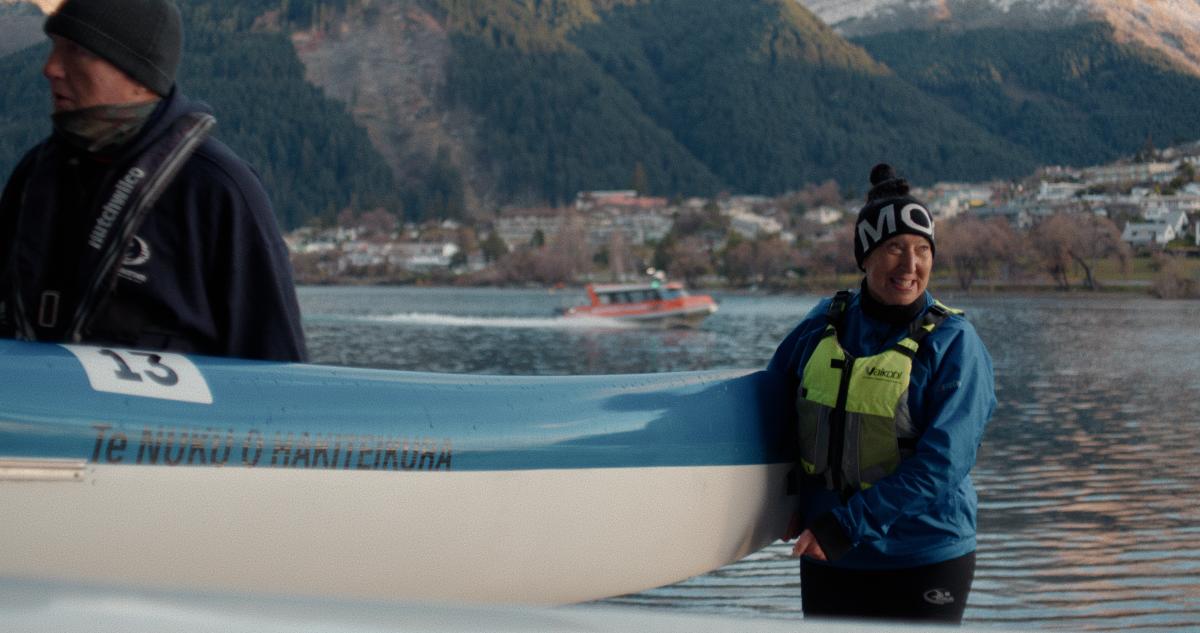
Queenstown local, Frances Piacun
Keeping work and life in balance
For many, the decision to move to Queenstown is a pursuit of balance.
“I also like to simply sit in peace. One of my favourite things is having a cup of tea and a caramel square in Glenorchy, just sitting, looking, and being. If you have a busy life, being still in this gorgeous region is amazing,” Explained local entrepreneur Karen Hattaway
Whether skiing before work, a lunchtime hike, or an evening sampling local wines, Queenstown offers an unparalleled work-life balance that's hard to match.
A hub of innovation and opportunity
Despite its serene setting, Queenstown is a hub of innovation and growth, offering diverse opportunities across tourism, hospitality, and tech sectors.
“I’ve experienced firsthand what it's like to think big and be told something wouldn't work. When I was trying to find the right spot for Blue Kanu, I was told many things. That Queenstown wasn't ready for this. That Pacifica Māori fusion food with an Asian influence wasn’t going to work. I wasn't listening. I see Blue Kanu as more than a restaurant. It’s Manaakitaka (showing respect, generosity and care for others). It's the way I believe hospitality should be given,” said Karen Hattaway Founder of Blue Kanu .
Hattaway sheds light on the town's entrepreneurial spirit. After opening multiple restaurants here herself, you can see how the environment evokes innovation and business ambition.
But it’s not just about the hospitality and tourism scene. You will find Queenstown filled with a mix of eclectic careers including artists, writers, those in the film industry and sporting profession. With the scenery on offer it is no wonder creatives find this town a place to be inspired.
“Arrowtown has this really interesting community. It's small enough that everyone knows everyone but full of people from all different walks of life. In Arrowtown, you can have a famous musician or artist next to a salt of the earth Central Otago type,” explained Charlotte who lives in the picturesque Queenstown suburb of Arrowtown .
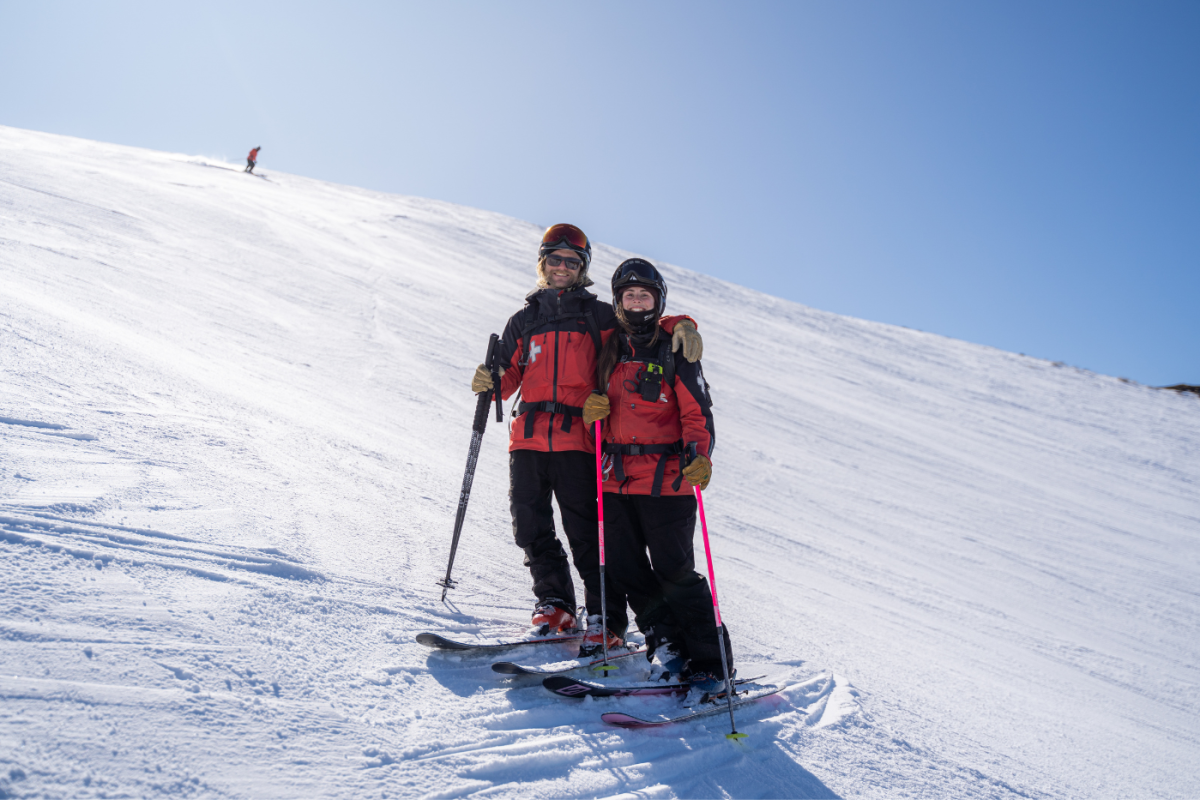
Queenstown couple, Sam and Charlotte
Embracing sustainability and nature
Living in Queenstown comes with a deep respect for the natural environment. Locals are at the forefront of sustainability, keen on preserving the beauty that surrounds them.
“Reforestation is not just a good choice for the future of Coal Pit. It also honours Queenstown. We're lucky to call ourselves locals, and it’s our responsibility to be stewards of the land,” told Anika who is a Gibbston -based wine maker. Anika was born in Ohio, and after travelling all over the world making wine, Anika decided to make Queenstown home.
The region is on a journey to regenerative tourism. We're aiming for a carbon zero visitor economy by 2030 . Our goal to change the way people travel for good in becoming a regenerative destination by 2030 is a world first – luckily we have so many locals passionate about sustainability.
“We donate to the Whakatipu Reforestation Trust and go to their planting days, so if you want to give back to the community in an environmental sense, they do amazing reforestation work.” Pete Oswald , a free skier reflects on the community's commitment to eco-friendly practices and the active lifestyle that the great outdoors supports.
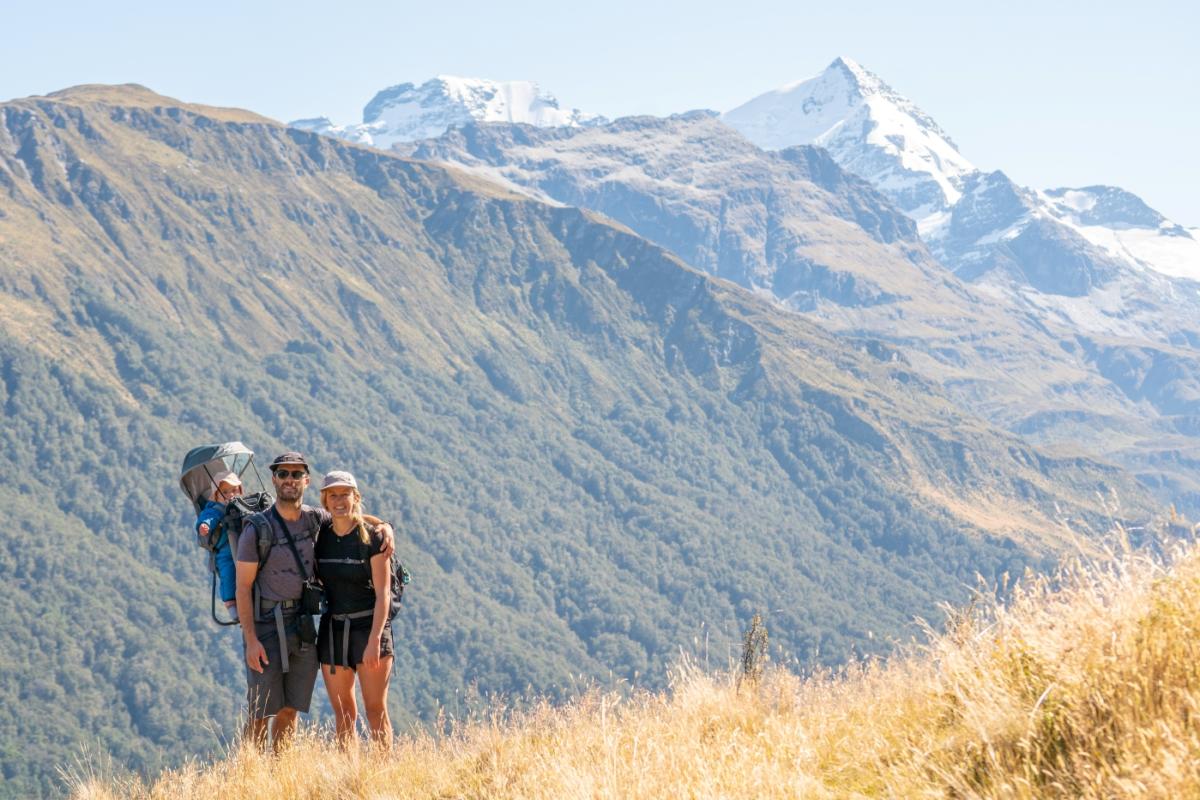
Pete Oswald and family
A cultural melting pot
Queenstown's appeal is global, attracting people from all corners of the world. This cultural diversity enriches the town with international cuisines, festivals, and traditions.
Mel’s story has familiar beginnings – a young traveller falls in love with New Zealand, in particular Queenstown, where she has scored work as a ‘lifty’ at Coronet Peak ski field. “I visited other places,” she explained, “but when I reached Queenstown I knew I’d found the place for me.”
The attraction of Queenstown goes beyond its mountainous landscapes and adventure sports; it's the quality of life, the community, and the opportunities that make residents proud to call it home.
Through the voices of the locals, it's clear that Queenstown offers a unique blend of natural beauty, community warmth, and vibrant living.
Whether you're seeking adventure, a change of pace, or a new family-friendly place to call home, Queenstown embodies the essence of living life to the fullest.
Come for the views, stay for the lifestyle.
Navigation for News Categories
Queenstown council backs plans to be carbon zero visitor economy.
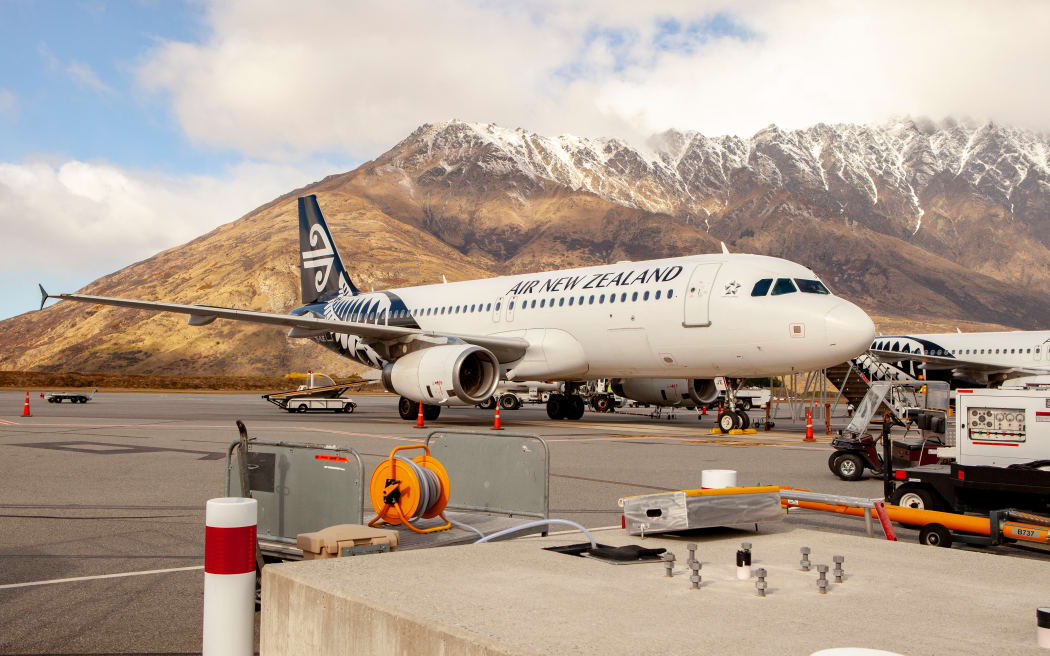
The destination management plan is pushing a roadmap to regenerative tourism. Photo: 123RF
The Queenstown Lakes District Council has endorsed plans to become a carbon zero visitor economy by 2030.
The destination management plan offers a roadmap to regenerative tourism and is a collaboration involving Destination Queenstown, Lake Wanaka Tourism and the council.
While tourism contributed 21 percent to the district's GDP in 2021, it was expected to return to its pre-Covid-19 levels of 40 percent soon.
The plan said choosing decarbonisation as the first peak to climb was intentionally ambitious and didn't allow for delay but it was possible through collaboration.
It also aimed to increase the total value of the visitor economy while building economic resilience.
Today, councillors voted to endorse the plan, with mayor Glyn Lewers urging councillors to help the plan to succeed.
"If we show leadership in this space and really drive it individually as each councillor here sitting at this table, I think we, no matter whether we endorse it or adopt it, I think we can drive this plan to great height and really force that change that this district has called out for," Lewers said.
A report was tabled to the council, detailing the plan and the recommendation to endorse it.
The council's strategy and policy general manager and report author, Michelle Morss, said they had taken the view that decarbonisation was essential if the district was going to achieve regenerative tourism.
"That's actually only 2882 days away from now so there has been some progress being made," she said.
"That has so far involved a line-by-line assessment of all of our emissions as a district - the good, the bad, the ugly.
"We're including aviation, we're not shying away from anything at all. Identifying some gaps and some ways that we can move forward with this work."
An endorsement meant they were able to progress the plan into more detail and pursue funding, she said.
The report confirmed that scoping work was underway to define the delivery of that key project and it's expected to be finished next month.
An investigation with the government is also underway to understand how the project can be funding, with the report saying it required significant investment.
- Mayor disappointed with Queenstown Lakes' new short-term renting rules
- Up to 530,000 international visitors expected amid tourism sector labour shortages
- environment
Copyright © 2023 , Radio New Zealand
- Wellington developers hint at when city will see new apartment buildings
- Transpower warns of possible power shortages on Friday
- Woolworths tells 79,000 they won a prize, then rescinds it
Get the RNZ app
for ad-free news and current affairs

Top News stories
- Explainer: What does Frank Bainimarama's custodial sentence mean for Fiji politics?
- Wintry weather: 'The current cold spell isn't going anywhere'
- Nurses protest, warn patients being left in pain, soiled beds due to staffing shortages
- Enchanter trial: Courtroom in tears hearing emotional interview of Lance Goodhew
- Pressure on power supply 'timely wake up call' for industry
Business RSS
Follow RNZ News
Kā Ratoka
- Rates & Property
- Rubbish & Recycling
- Building Services
- Resource Consents
- Environmental Health
- Transport and Parking
- Alcohol Licensing
- Animal Control
- Environment and Sustainability
- Water Services
- Services A - Z
- CCTV - Public Use

Find out where to park, where not to park, what to do if you get a ticket and info about the permits available.
- Setting the Rates
- New Wastewater Rates for Cardrona
- Revaluation and how it affects rates
- Rates Dates & Payment Options
- Changing your details
- Property Information Search
- Online Rates Payments
- Rates Rebates, Remission & Postponement
- Short-Term Visitor Accommodation
- Other Information
- How we recycle in the Queenstown Lakes District
- Cut your waste
- Commercial Services
- Rubbish & Recycling Collection
- Recycling Centres
- Transfer Stations
- Solid Waste Assessment
- Waste Minimisation Community Fund
- Waste Minimisation for Businesses
- Zero Waste Events
- Other Waste
- A-Z Directory Feedback
- Building consents
- Application forms, checksheets and guidance
- Upload & Pay
- Building services
- Additional information
- Contact the Building Services Team
- Application forms and fees
- Current resource consents
- Development contributions
- Duty Planner
- Engineering acceptance
- Find your zone using GIS
- How to use the District Plan to know the rules
- Land developments and subdivisions
- National Policy Statements and National Environmental Standards
- Notified resource consents
- Practice notes and guidance
- Pre-application meetings
- Resource consent process
- Camping Grounds
- Complaints and concerns
- Fee Schedule
- Food Safety Guidelines
- Funeral Directors
- Hairdressers
- Noise Control
- Offensive Trades
- Public Transport
- District-wide speed management review
Winter Road Reports
- Transport Strategies
- Driving in New Zealand
- Driver Training and Road Safety
- Corridor Access Requests
- Kā Huanui a Tāhuna
- Alcohol Public Notices
- Find the right alcohol licence and apply
- Rugby World Cup Information
- Alcohol licence fee calculator
- Renew and/or vary your alcohol licence
- Manager's certificates
- Legal requirements for licence holders
- District Licensing Committee decisions
- ARLA annual report
- Alcohol-Free Areas In Public Places
- Have your say on alcohol licence applications
- All alcohol licensing forms
- Register Your Dog
- Renew Your Dog's Registration
- Contact Animal Control
- Dog Control Bylaw & Policy
- Adopt a Dog
- Lost & Found Dogs
- Microchipping
- Scuttlemutt
- Queenstown Airport
- Wānaka Airport
- Glenorchy Aerodrome
- Pest Control
- Volunteer/Community Agreement Registration
- Vegetation Control
- Pollution Response
- Water Supply
- Connection to Water, Wastewater and Stormwater
- Trade Waste Discharge Consent
- Ash and Burial Interments
- Baby Memorials
- Locations and Maps
- Memorial Headstones and Plaques
- Queenstown Cemetery Restoration
- Services A - Z expand_more Back Services A - Z
- CCTV - Public Use expand_more Back CCTV - Public Use
- Shotover River Concession Area - Permit
Do It Online
Meinga ipurangi.
- Make a Payment
- Registrations
- Maps & Spatial Data
- Submit an Application
- Contact Us / Fix It
- Community Text Alert sign up
- Make a Complaint
Let's Talk Kōrero Mai
- Login to TechOne

Let's Talk Kōrero Mai (previously Scuttlebutt) is our bi-monthly newsletter which goes out to residents and ratepayers.
- Rates Instalment
- Application Fees
- Register your Dog
- Register for a transfer or refund of dog registration fee
- Renewal for Hairdressers, Campgrounds, and Offensive Trade Registrations
- Activities in a Public Place - Application Form
- Register as a Homestay
- Register as Residential Visitor Accommodation
- Register for our public notification list
- Register to speak at Public Forum
- Register for Kerbside Collection Services
- No Spray Register
- Book an Inspection
- Event Enquiry Form
- Venue Booking Form
- Proposed District Plan forms
- Change of Address Form
- Change Dog Registration Details
- Forward Works Viewer
- Apply for Resource Consent
- Apply for a Parking Waiver
- Apply for Tourist Signage
- Development contribution costs - Request for reconsideration
- Local Community Support
- Summer Services
- About this website
- Community Text Alert sign up expand_more Back Community Text Alert sign up
- Make a Complaint expand_more Back Make a Complaint
- Let's Talk Kōrero Mai expand_more Back Let's Talk Kōrero Mai
- Login to TechOne expand_more Back Login to TechOne
Ngā Hapori
- Community Connect
- Welcoming Communities
- Arts, Culture and Heritage
- Citizenship Ceremonies
- Community Associations and Groups
- Community Funding
- Community Research
- Community Wellbeing
- Economic Development
- Emergency Management
- Energy Saving Tips
- Event Planning and Venues
- Māori Community
- Managing the risk of wildfire
- Population and Demand
- Tuia Programme

Keep up to date with our road conditions throughout the colder months.
- Summerdaze endorsed events
- I want to help
- I need accommodation help
- Tips for employers
- Community Connect expand_more Back Community Connect
- Our Advisory Groups
- Our Publications, News and Resources
- Our progress towards a Welcoming Plan
- Contact Welcoming Communities
- Wakatipu Heritage Trust
- Citizenship Ceremonies expand_more Back Citizenship Ceremonies
- Community Associations and Groups expand_more Back Community Associations and Groups
- Community Funding expand_more Back Community Funding
- Wellbeing Dashboard
- Community Wellbeing expand_more Back Community Wellbeing
- Diversifying our economy
Supporting tourism to become regenerative
- Building business capability and talent
- Film Queenstown Lakes
- Be Prepared
- Helpful Resources
- Community Response Groups
- Weather Event - September 2023
- Energy Saving Tips expand_more Back Energy Saving Tips
- Event planning
- Useful event resources
- Event Waste and Emissions Reduction Guide and Toolkit
- Māori Community expand_more Back Māori Community
- Managing the risk of wildfire expand_more Back Managing the risk of wildfire
- Population and Demand expand_more Back Population and Demand
- Tuia Programme expand_more Back Tuia Programme
- Venue Hire expand_more Back Venue Hire
- Winter Wander
Kā mahi a te rēhia
- Queenstown Events Centre
- Wānaka Recreation Centre
- Paetara Aspiring Central
- Learn to Swim
- Kids' Recreation
- Sport & Rec Venues and Contacts
- Courts and Fields
- Memberships - Join Today
- Join the Sport & Rec Team
- Responsible Camping in the Queenstown Lakes District
- Parks and Walkways
- Lakes and Boating
- Mountain Biking
- Horse Riding
- Splash Café
- Wallis Physiotherapy
- Alpine Physiotherapy
- Physiotherapy
- Playgrounds
- School Holiday Programmes
- Gym & Group Fitness

Hip Hop Fit
Learn to dance and get fit!
- Sport leagues and programmes at QEC
- Kid's Programmes at Queenstown Events Centre
- Wānaka Recreation Centre Pool
- Sports Leagues & Programmes at Wānaka
- Book a space
- What's on at Paetara
- Programmes @ Paetara
- Alpine Aqualand
- Arrowtown Memorial Pool
- Aquatics Programmes & Water Sports
- Our Supervision Policy
- Aqua nappies
- Sensory Sessions
- Learn to Swim expand_more Back Learn to Swim
- Golf Enquiries
- Birthday Parties
- Holiday Swim Weeks
- QLDC Libraries Holiday Programme
- LAN Club @ Wānaka Recreation Centre
- Arrowtown Summer Camp
- Court, Field and Equipment Hire
- Courts and Fields expand_more Back Courts and Fields
- Memberships - Join Today expand_more Back Memberships - Join Today
- Join the Sport & Rec Team expand_more Back Join the Sport & Rec Team
- Frequently Asked Questions
- Upper Clutha Tracks Trust
- Queenstown Trails Trust
- Pigeon Island
- Boat Ramp Permit Fees
- Boat Safety
- Jetties and Moorings
- Mountain Biking expand_more Back Mountain Biking
- Horse Riding expand_more Back Horse Riding
- Splash Café expand_more Back Splash Café
- Wallis Physiotherapy expand_more Back Wallis Physiotherapy
- Alpine Physiotherapy expand_more Back Alpine Physiotherapy
- Physiotherapy expand_more Back Physiotherapy
- Playgrounds expand_more Back Playgrounds
- School Holiday Programmes expand_more Back School Holiday Programmes
- Group Fitness
- Personal Training
- Gym Programmes
Your Council
Te kaunihera ā-rohe.
- Consultations
- Council Documents
- Climate Change and Biodiversity
- District Plan
- Elected Members
- Major Projects
- Media Centre
- Meetings & Committees
- Our Vision & Mission
- Privacy and official information requests
- Public Notices
- Sister Cities

Check out what positions we are currently recruiting for.
- News expand_more Back News
- Why work for QLDC?
- Our benefits
- Consultations expand_more Back Consultations
- Ten Year Plan (LTP)
- Agendas & Minutes
- Annual Plans
- Annual Reports
- Asset Management Plans
- Awarded Council Contracts
- Capex Quarterly Update
- Monthly Reports
- National Policy Statement - Urban Development 2020 (NPS-UD)
- Pre-election reports
- Queenstown Lakes Spatial Plan
- Reserve Management Plans
- Section 10A Reports
- Small Community Plans
- Strategies and Publications
- Submissions from QLDC
- Climate Change and Biodiversity expand_more Back Climate Change and Biodiversity
- Operative District Plan
- Proposed District Plan
- National Policy Statement-Urban Development (District Plan Amendments)
- Urban Intensification Variation
- District Plan maps
- A Guide to Plan Changes
- Inclusionary Housing Variation
- Landscape Schedules
- Te Pūtahi Ladies Mile Variation
- Register of Interests
- Community Appointments
- Past elections
- Wānaka Youth and Community Centre - Aspiring Central
- Hawthorne Drive intersection improvements
- Media Centre expand_more Back Media Centre
- Tips for participating in meetings online
- Diversity, Equity and Inclusion statement
- Our published responses to information requests
- Scheduled Event Road Closures
- Sister Cities expand_more Back Sister Cities
An area of focus is gaining more value from the visitor industry. This is because tourism is our district's largest industry and combined with construction employs more than 60% of our local workforce.
Destination Queenstown and Lake Wānaka Tourism market our district internationally and nationally. From the visitors who are attracted here, the Economic Futures team works to maximise the benefits for our community. This includes efforts to increase the margins and wages in the industry and the ability to find and retain staff.
Key projects
Understanding the Lifetime value of the visitor
For too long we have focused on measuring the value of tourism by adding up the transactions made while the visitor is in New Zealand. This neglects the longer-term influence that visit may have on a person’s subsequent purchasing, investment, study, and migration choices. The team is working with Central Otago District Council and Auckland Unlimited to research the lifetime value of the visitor. This will help curate the visitor experience, with the aim of more effectively influencing visitors’ long-term choices and economic benefit to the country once they return home.
Destination Management Planning
The pandemic created a unique opportunity to rethink the purpose of the visitor sector, the principles we operate under, and how we measure success. QLDC partnered with Destination Queenstown and Lake Wānaka Tourism to develop a Destination Management Plan for the district – Regenerative tourism by 2030. More information on this plan can be found at: https://www.queenstownnz.co.nz/regenerative-tourism-2030/
Tourism Marketing Organisations
Destination queenstown.
www.queenstownnz.co.nz
Lake Wānaka Tourism
www.lakewanaka.co.nz
Stay up-to-date
Sign up to our newsletter Scuttlebutt and stay up-to-date with the latest news, events & information in the Queenstown Lakes District.
25 March 2022 Regenerative tourism a focus for Queenstown Lakes District
25 March 2022
The Queenstown Lakes District Destination Management Plan aims to include regenerative tourism practices by 2030.
Lake Wānaka Tourism General Manager Tim Barke gave the first update on the management plan since its inception in 2020 at the University of Otago's Tourism Policy School yesterday.
The plan was introduced as part of the Government's response to how the pandemic was challenging the tourism industry.
These regenerative tourism practices are sustainability efforts that will enhance both the visitor economy and local communities by giving locals an authentic voice in shaping their future, using economically sustainable and agile leadership, and embracing change by learning from the past to plan for the future, Mr Barke says.
The change is the result of significant consultation, including stakeholders from a range of sectors, more than 50 interviews, community forums, involvement in the “Quality of Life 2021” survey, and panel discussion at the WAO Summit, a community non-profit set up to educate, inspire and enable New Zealand communities to move towards a regenerative future.
This collaboration reveled the importance of manaakitanga (mutual respect), whanaungatanga (close connection between people), supporting local, and equally sharing kaitiakitaka (guardianship) of communities.
“Prior to COVID‑19, tourism was booming in the district with roughly 50 per cent of full-time jobs within the sector, the local accommodation and food sector growing by 149 per cent between 2000 to 2020, and 44 per cent of the district's GDP coming from tourism by the 2020 year-end,” Mr Barke says.
“However, change came when the pandemic disrupted travel patterns, technology evolved, the climate crisis recommended a 50 per cent reduction in CO 2 by 2030, and when societal expectations shifted as consumers demanded more ethical tourism; we had to change the way we were doing things.”
University of Otago Associate Professor Susan Houge Mackenzie, from the Department of Tourism , says having multiple agencies involved was critical to regenerative thinking as this approach needs to be cross sector.
“A regenerative approach to tourism needs to be fundamentally holistic and so it's wonderful to see partnerships and whānaukataka [reciprocal relationships] highlighted as key values in the Queenstown Lakes District Plan,” Associate Professor Houge Mackenzie explains.
“Focusing on community well-being and fostering meaningful connections with visitors is central to rebuilding and regenerating tourism destinations across Aotearoa ; concentrating on capacity and capability will be critical to achieving the aspirations of this plan.”
The fourth annual University of Otago Tourism Policy School is a two-day event bringing together a wide array of policymakers, business leaders, industry organisations and tourism academics to discuss key challenges and opportunities confronting the New Zealand tourism industry.
This year's theme is “Structural Change for Regenerative Tourism”, reflecting the view of the Minister of Tourism Hon Stuart Nash that structural change is required to rebuild tourism for the 21st century, following the global pandemic.
For more information, contact:
Tim Barke General Manager, Lake Wānaka Tourism Tel +64 3 443 1574 Email [email protected]
Associate Professor Susan Houge Mackenzie Department of Tourism University of Otago, Dunedin Tel +64 3 479 4293 Email [email protected]
Molly Houseman Communications Adviser, Media Engagement University of Otago, Dunedin Mob +64 21 279 5016 Email [email protected]
Find an Otago expert
Use our Media Expertise Database to find an Otago researcher for media comment.

Search form
- Send Us Your News
- Wedding Guide
- Death Notices
- Privacy Policy
- Drive South
- Media Council Complaints
Regenerative tourism plan on drawing board
You are not permitted to download, save or email this image. Visit image gallery to purchase the image.
Three agencies have begun designing a regenerative tourism plan for the Queenstown Lakes district.
Destination Queenstown, Lake Wanaka Tourism and the Queenstown Lakes District Council want to work with the community, visitor industry and stakeholders to develop a road map for tourism up to 2030.
The project is being funded by central government.
Perspectives will be gained through more than 40 one-on-one stakeholder interviews.
There will be eight design forums across Wanaka, Arrowtown, Glenorchy and Queenstown for group discussions; up to 10 interactive events for the community; and an online survey to help diagnose current issues and imagine new pathways towards a regenerative tourism future.
Queenstown Lakes Mayor Jim Boult said the plan would help the community thrive, while protecting and enhancing the environment, flora and fauna.
The group would explore how the visitor economy could serve and add value to the district, ecosystems and communities, in a way that delivered appropriate financial benefits and a thriving economy, Mr Boult said.
Destination Queenstown interim chief executive Ann Lockhart said the project was an exciting opportunity to collaborate, plan and make decisions.
The district was moving into a new era of thinking around how to create value more broadly for the benefit of people and place, she said.
Lake Wanaka Tourism general manager Tim Barke said that the project would help develop a deeper understanding of community values.
An independent Industry Leaders Advisory Group is overseeing the project. Its members are Bridget Legnavsky, Henry Van Asch, Mandy Bell, Richard Thomas and Adam Smith.
Planning experts Proxima and Destination Think are also working on the project.
The first community events will be held in Wanaka (July 5), Arrowtown (July 6), Glenorchy (July 7) and Queenstown (July 8).
More information is on the Lake Wanaka Tourism and Destination Queenstown websites.
Related Stories
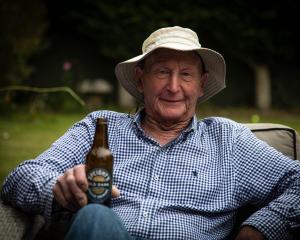
Queenstown characters leave fond memories

Queenstown Lotto player didn't believe $1m win
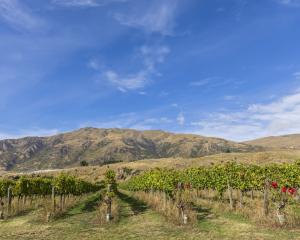
Dark sky park gains international certification
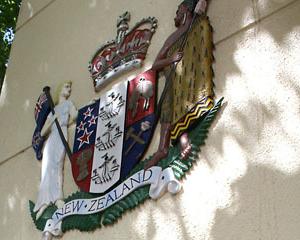
‘Departure will reduce criminal element’
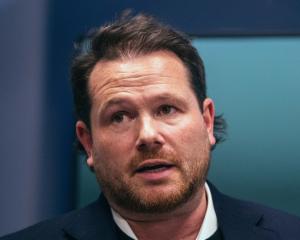
Five Mile project nearer to realisation
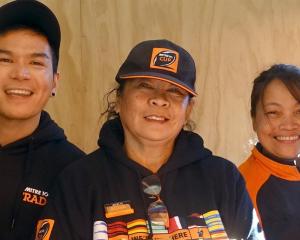

Queenstown’s Mitre 10 Mega BBQ For Good
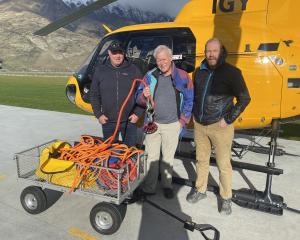
Life-saving rope donated
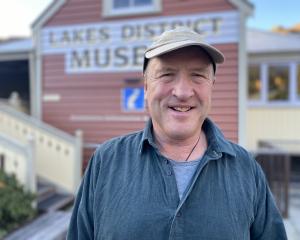
An ex-museum director’s musings
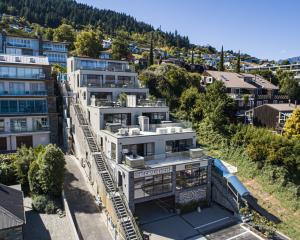
Hotel’s creditors owed millions

Bungy founder's pooch out of the doghouse

Cocaine dealer to be deported after sentence
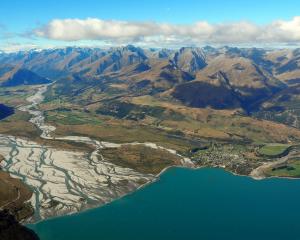
Damage to houses in major quake put at $100m+
Add a comment.
Advertisement
Support the regeneration of Wānaka’s environment – find out how .
- About Wānaka
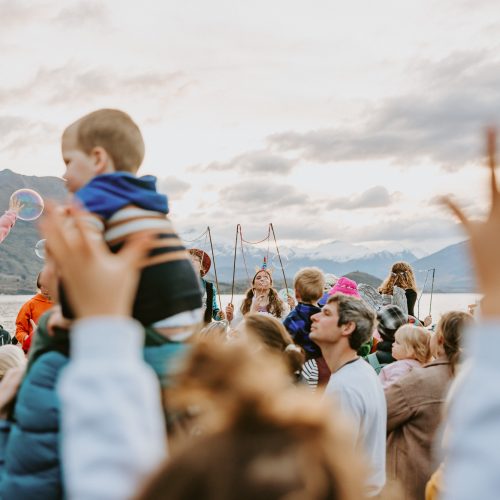
- Plan Your Trip
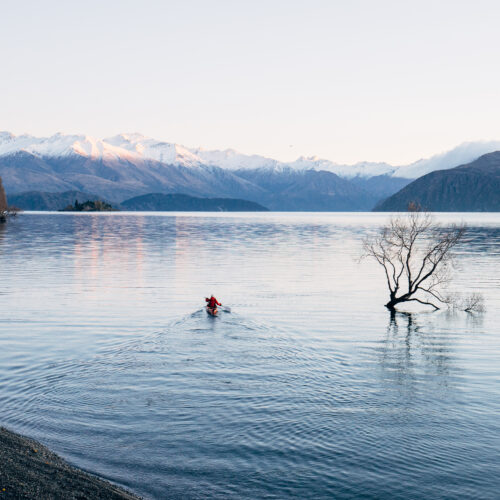
- Things To Do
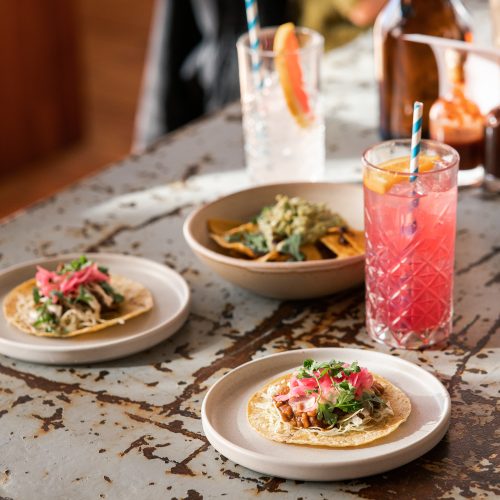
- Kā mahi o te rēhia What’s On
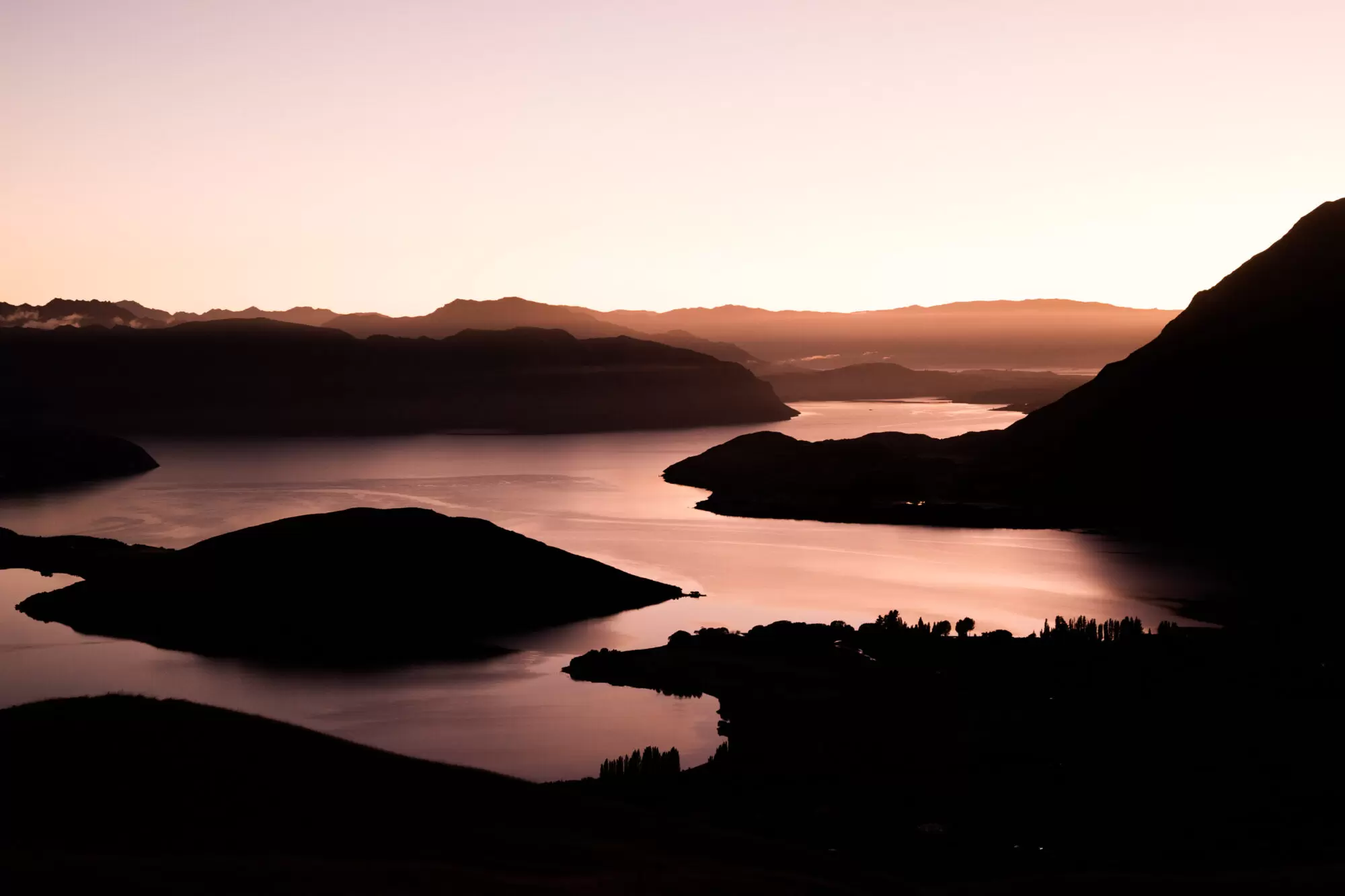
Regenerative Tourism by 2030: Lake Wānaka Tourism, Destination Queenstown and Queenstown Lakes District Council.
Our vision is for the tourism industry to evolve in a way that puts people and place at its centre and enables a viable and regenerative tourism future by 2030.
The tourism landscape has changed considerably over the last year. Pre-COVID, commentary around the tourism industry often included pressures on the environment, our local community, as well as resultant effects on local infrastructure, facilities, and roads. Post-lockdown, this conversation has shifted to how this core industry should look if and when international travel returns in scale.
This is the key driver for establishing this process now, in partnership with Destination Queenstown and Queenstown Lakes District Council (QLDC). Made possible through Government funding, our vision is to develop a co-designed plan to a regenerative tourism industry by 2030.
This will be a multi-year plan developed together with the Queenstown Lakes community, visitor industry and stakeholders, to ensure we can answer the big question:
How can the visitor economy be in service of, and adding value to the district, its living ecosystems and its communities in a way that also delivers appropriate financial benefits and a thriving economy?
While this plan will not seek to address infrastructure challenges (as this is covered in other pieces of work managed by QLDC and Government), it will seek to enhance our tourism offering in a way which benefits the local community and iwi, drives environmental custodianship, supports quality visitor experiences, attracts markets that align with the district’s shared community values, and encourages investment and partnerships.
How can we create change?
To be successful in driving change we first need to understand, explore and address the big question. This will help us understand how we can shape a positive future for tourism and foster a harmonious relationship between all of us as locals and our visitors.
Lake Wānaka Tourism and Destination Queenstown the Regional Tourism Organisations (RTOs), have teamed up to help lead the change, in partnership with QLDC. The RTOs have secured Government funding to enable this work and the following partners have been engaged to provide expertise and guidance:
- Proxima Consulting , a sustainability consulting firm specialising in strategy development for a thriving future. Proxima is working with Anna Pollock (Conscious Travel), an internationally recognised expert in regenerative tourism, and Jerome Partington, a leading New Zealand regenerative design practitioner.
- Destination Think! , a global destination planning and place marketing firm which has created world-leading strategic plans for places of all sizes from towns to continents.
- Create this tourism future together with no pre-determined outcomes.
- Commit to co-designing a regenerative tourism model that protects and enhances our taonga , links strongly to our values, creates pride in its strength of conviction and purpose, and enables a thriving future.
- Work with the local tourism industry, community and stakeholders to co-design a plan for the Queenstown Lakes district which will provide a roadmap for moving the district toward a regenerative tourism future by 2030.
- Put our local community, visitors, and unique and beautiful district at the heart of the plan. To ensure we create outcomes that enrich the district across all four wellbeings (social, cultural, environmental and economic) and enable a thriving future.
- Focus specifically on placemaking in this plan. This is an opportunity to shape the destination to benefit the local community and iwi; drive environmental custodianship; support quality visitor experiences; target markets that align with our values; and encourage investment, partnerships and sustainable growth in high value jobs and businesses.
- Lead the process with destination management, sustainability and tourism experts. The process and outcomes will inform and upskill the local tourism industry and community about regenerative tourism, creating a common understanding and a culture of learning and sharing. It will also assist in developing a more productive, sustainable and inclusive visitor sector which generates economic opportunities and social benefits across our region.
Our objectives
- Provide a roadmap for regenerative tourism that is aligned and integrated with the region’s guiding plans and strategies.
- Adopt a destination management approach that aligns with MBIE’s Destination Management Guidelines .
- Give effect to the New Zealand Aotearoa Government’s Tourism Strategy .
- Support an inter-agency approach to regenerative tourism that enriches the district across all four wellbeings and across the tourism system.
- Support a sustainable and healthy local economy, ensure natural systems and the environment are thriving, enrich all layers of cultural fabric, enable community wellbeing through purposeful relationships and generate positive advocacy from the local host community.
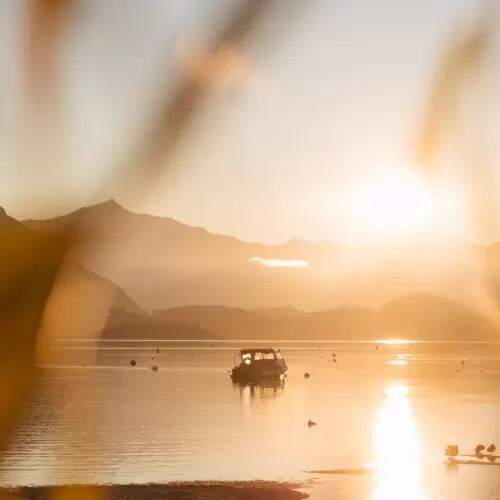
We use cookies so that you get the best experience on our site.
Create Account
Forgot your password.
Tell us your email address, and we'll get you back on track in no time.
- Advertise with us

- Headline News
- Business News
- Coronavirus (Covid-19)
- Global Travel Connoisseur
- Airfare Deals
- Black Friday / Cyber Monday Sales
- Competition
- Cruise Deals
- Hotel Deals
- Industry Deals
- Travel Deals
- NORTHERN TERRITORY
- SOUTH AUSTRALIA
- WESTERN AUSTRALIA
- OTHER States
- COOK ISLANDS
- NEW ZEALAND
- Destination Global
- Middle East
- South Pacific
- North Asia News
- Oceania News
- Dining | Restaurants
- Food & Beverage
- Hotel Features
- Lifestyle Features
- Travel Feature
- Destination Feature
- Hotel Developments
- Hotel Openings
- Hotel Trends
- Resort News
- Luxury Hotels
- Serviced Apartments
- Health and Wellness
- Lifestyle News
- Travel Goods
- Conferences
- Exhibitions
- Events Calendar
- Trade Events
- Movers & Shakers
- Cultural Tourism
- Agents Incentives
- Eco-Tourism
- Golf Tourism
- Medical Tourism
- Travel Advisors
- Responsible Tourism
- Rural & Agri
- Sustainable Tourism
- Theme Parks
- Tourist Boards
- Tour Operator
- Travel Warnings
- CRUISE NEWS
- Adventure Cruises
- Car Rentals
- Cargo & Freight
- Cruise News
- Expedition Cruises
- Motor Cycles
- Recreation Vehicles
- River Cruising
- Association
- Social Media
- Statistics & Trends
Select Page
Queenstown Leaps Towards Carbon-Free Tourism!
Posted by Peter Needham | Jun 23, 2023 | Headline News , New Zealand , Trade Events | 0 |
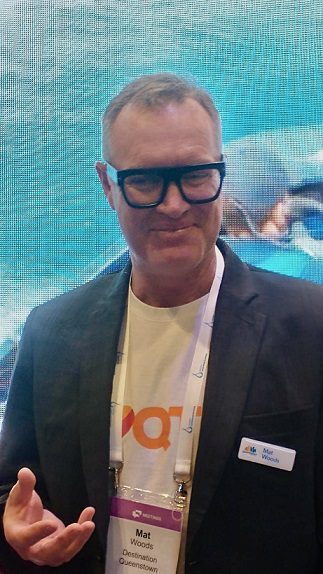
Destination Queenstown chief executive Mat Woods outlined the initiative at MEETINGS 2023 in Wellington.
Woods added that Queenstown is performing spectacularly after the Covid-induced slump. Visitation has already recovered to pre-Covid levels, a faster rate of progress on that front than the rest of New Zealand has achieved overall.
The challenge for Queenstown Lakes is to attain carbon-zero status, with electric jetboats and aircraft likely to play a part.
In the meantime, the region’s roadmap to its ambitious goal is detailed in the Queenstown Lakes destination management plan (DMP), Travel to a thriving future which was created through a partnership between two neighbouring regional tourism organisations; Destination Queenstown and Lake Wānaka Tourism; along with the Queenstown Lakes District Council (QLDC) and with input from Kāi Tahu and the Department of Conservation.
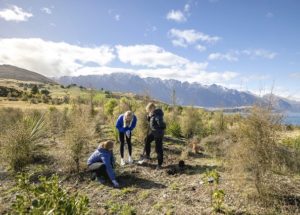
Tourism is the primary industry in this alpine region, renowned for its spectacular natural beauty. The DMP sets out to drive a solution to the challenges and opportunities high-volume visitation poses for the region and ensure that tourism supports a thriving community – environmentally, socially, culturally and economically.
Scoping work has already begun on how the region will decarbonise the visitor economy – this keystone project is considered a prerequisite to creating a regenerative tourism economy. Several Queenstown organisations are already aligned with the carbon zero goal, including the world’s first electric jetboat (Shotover Jet), the world’s first accommodation certified according to the Living Building Challenge – even the iconic 110-year-old steamship is working out how to decarbonise.
Another project has seen a funding platform established called Love Queenstown (or Love Wānaka), enabling visitors and businesses to positively impact Queenstown and Wānaka through their activities and experiences by supporting local climate, conservation, and biodiversity initiatives. The platforms will also connect visitors to tangible projects and enable them to volunteer alongside local environmentalists on initiatives that make a difference.
Written by: Peter Needham in Wellington, New Zealand
======================================.
- Mind Blowing Line-Up Announced For Sydney Science Festival 2018
- Kenes Group Mourns the Loss of Founder and President Gideon Rivlin
- SWISS further expands its network for summer 2022 and offers new destinations
- ATECA Hotel Suites in Tashkent Wins Traveller Review Award 2022
- New research reveals 50% of Australians feel confused about tipping when overseas, with one in five choosing not to leave a gratuity when dining out!
- Meliá Hotels International celebrates grand opening of Meliá Koh Samui, its first hotel in Thailand
- Tropical Bliss Awaits As Yasawa Island Resort & Spa, Fiji Unveils The Ultimate “Isolate In Paradise” Resort Buyout
- Casa Angelina’s Un Piano Wins Michelin Star!
- IT&CMA and CTW Asia-Pacific To Defer Its Physical Event To 2021
- Where does your fund rank?
Share this:
Leave a reply cancel reply, subscribe to our newsletter.
Subscribe to our newsletter!
- Australian Capital Territory
- Breaking News
- Cook Islands
- Faith Tourism
- New Caledonia
- New South Wales
- New Zealand
- Northern Territory
- Philippines
- Saudi Arabia
- Solomon Islands
- South America
- South Australia
- Space Tourism
- Western Australia

Sponsor/Partners

Advertisement

Popular Posts
- February 2024
- January 2024
- December 2023
- November 2023
- October 2023
- September 2023
- August 2023
- February 2023
- January 2023
- December 2022
- November 2022
- October 2022
- September 2022
- August 2022
- February 2022
- January 2022
- December 2021
- November 2021
- October 2021
- September 2021
- August 2021
- February 2021
- January 2021
- December 2020
- November 2020
- October 2020
- September 2020
- August 2020
- February 2020
- January 2020
- December 2019
- November 2019
- October 2019
- September 2019
- August 2019
Regenerative tourism futures: a case study of Aotearoa New Zealand
Journal of Tourism Futures
ISSN : 2055-5911
Article publication date: 10 May 2022
Issue publication date: 22 September 2022
This case study urges the future of visitor economy to rely on regenerative tourism to make tourism systems resilience in the long run.
Design/methodology/approach
The paper draws on published research and industry reports to discuss the future visitor economy and its impact on all dimensions of well-being focused on the case of Aotearoa New Zealand.
Results show that post-pandemic tourism transformation must protect and promote local identities, and enhance and enrich visitor experiences with a focus on cultural and natural heritage.
Originality/value
The recovery of tourism must not implement regenerative tourism as a new specific type of tourism but as a holistic understanding of tourism futures that encompasses communities and the environment, and where visitors are committed to preserve and protect our natural and socio-cultural environment.
- Aotearoa New Zealand
- Regenerative tourism
- Tourism transformation
- Visitor economy
Fusté-Forné, F. and Hussain, A. (2022), "Regenerative tourism futures: a case study of Aotearoa New Zealand", Journal of Tourism Futures , Vol. 8 No. 3, pp. 346-351. https://doi.org/10.1108/JTF-01-2022-0027
Emerald Publishing Limited
Copyright © 2022, Francesc Fusté-Forné and Asif Hussain
Published in Journal of Tourism Futures . Published by Emerald Publishing Limited. This article is published under the Creative Commons Attribution (CC BY 4.0) licence. Anyone may reproduce, distribute, translate and create derivative works of this article (for both commercial and non-commercial purposes), subject to full attribution to the original publication and authors. The full terms of this licence may be seen at http://creativecommons.org/licences/by/4.0/legalcode .
Should we look back to move forward?
The planet has suffered the unsustainable consequences of tourism growth during the last decades ( Benjamin et al ., 2020 ; Gössling and Higham, 2021 ; Hussain et al ., 2021 ). Both domestic and international tourism relied on transport which heavily contributed to issues like climate change ( Dessens et al. , 2014 ; Scott et al ., 2012 ; Živoder et al ., 2015 ). While the coronavirus disease 2019 (COVID-19) has brought limited tourism ( Fusté-Forné and Michael, 2021 ), the international tourist arrivals in 2020 reached 400 m ( UNWTO, 2022 ). The post-COVID tourism recovery suggests a regenerative tourism paradigm with a focus on conscious travel ( Hussain, 2021 ) which leads to an effective transformation of the way we think, plan and do tourism ( Ateljevic, 2020 ; Cheer, 2020 ; Sheldon, 2020 ). The impact of COVID-19 offers the opportunity to reset tourism ( Higgins-Desbiolles, 2020 ). The new holistic approach embraces the implementation of the regenerative tourism model ( Hussain and Haley, 2022 ) which acknowledges the complexity of tourism systems. In the framework of regenerative tourism, this research discusses that tourism transformation must involve all stakeholders in the creation of long-term social, cultural, environmental and economic well-being with a specific focus on the case of New Zealand. This will drive towards future tourism experiences that put the well-being of destination communities at the centre of tourism management and marketing because “people” must lead the future of visitor economy.
A case of regenerative tourism in Aotearoa New Zealand
The physical isolation and remoteness of New Zealand attracts people from places where it is difficult to escape the pressure of population and offers them a less dense destination. Both domestic and international tourism have contributed to nation's prosperity and has potential to enrich all aspects of lives and livelihood of the people of New Zealand ( Parliamentary Commissioner for the Environment, 2019 ; Tourism Futures Taskforce, 2020 ). The COVID-19 pandemic has impacted the New Zealand tourism system which relied heavily on international tourists ( Fountain, 2021 ). Concerns about such dependency were raised in the past, however, it was the COVID-19 that showed us the severity of New Zealand's dependency on international tourists ( Hussain and Fusté-Forné, 2021 ). This shows that the tourism models, before COVID-19, were neither resilient nor sustainable ( Reis, 2020 ; Sheldon, 2021 ). More resilient tourism should rely on alternate tourism systems beyond capitalist practices, such as the regenerative economy because the traditional tourism models are not sustainable for the future. As Fountain (2021) also explains, the change to regenerative tourism should be based on three aspects: equity, sustainability and well-being.
New Zealand has focused on a balance between tourism and the well-being of its natural resources and local communities ( Glusac, 2020 ), where tourism businesses must lead the way to the achievement of New Zealand's regenerative tourism goals ( Waby, 2021 ). The importance of the stakeholders’ engagement in destination planning and development was acknowledged by the parliamentary commission report in 2019 which include government agencies, territorial authorities, iwi (a Māori tribe), hapū (Māori sub tribes) and commercial interest such as regional tourism organisations. The key aspect acknowledged in the report was that Ngāti Tūwharetoa (an example of iwi) sees themselves as guardians of Maunga Tongariro not as the owners. Therefore, “visitor behaviour is shaped to fit the maunga rather than the maunga being shaped to fit the visitors” ( Parliamentary Commissioner for the Environment, 2019 ). The recommendations of the report came as the time of the birth of COVID-19, which is why the report did not largely contribute towards stakeholder engagement for destination planning and product development yet.
In March 2020, New Zealand closed its borders for international tourism to stop the spread of COVID-19. This decision kept the COVID-19 out of the country, but it has had devastating impacts on destinations which heavily relied on international tourists ( RNZ, 2021 ; Stuff, 2021 ). Meanwhile the Minister of Tourism setup an independent tourism task force following a change from international travel to domestic tourism. The taskforce suggested that the future of New Zealand tourism must be regenerative and resilient with a focus on social, cultural, environmental and economic wellbeing. The key elements highlighted included the production of a genuine tourism product, unique life-changing experience, community engagement, opportunities to grow regeneratively, enrich value of Te Ao Māori, improve natural ecosystems and generate durable financial returns. The strategic tourism lines posted by the New Zealand Government calls for regenerative tourism which focuses on the partnership between industry, workers and government ( New Zealand Government, 2021 ).
During this time, various public and private agencies focused their research on meaning, essence and ways to develop regenerative tourism products and models. Regenerative initiatives such as “Project Regenerative Tourism” of Sustainability and Resilience Institute (SRI) of New Zealand, New Zealand Awaits, and The Seventh Generation Tours promote regenerative tourism research and experience for the visitor's to engage with the debate of regenerative tourism. The outcome of the “Project Regenerative Tourism” resulted in the development of a “Regenerative Tourism Model”. The model suggests the incorporation of all elements of social-ecological system into a system which is self-organising and embraces uncertainty and change in response of global shocks and trends. The model has also developed the indicators of regenerative tourism to measure the degree to which a tourism product of service is regenerative and sustainable. In addition, New Zealand Awaits encourages and shares conversation on the positive impact of travel experiences and learn about how regenerative tourism looks like in New Zealand through their podcast GOOD Awaits. The Seventh Generation Tours is a regenerative tourism enterprise which promotes the principles of Tūrangawaewae: know who you are, where you belong; Kaitiakitanga: protect that which you love; and Manaakitanga: share stories that enhance, so that you leave better. The tour “shares stories that regenerate, not only the listener, but the storyteller, the community and the place from which they come. The Sharing of important oral stories keeps them alive and passes them along, from one generation to the next as we are their guardians, and we must tell them well” ( The Seventh Generation, 2022 ).
At destination levels, Tourism Bay of Plenty (2022) develops tourism in harmony with place under the destination development plan Te Hā Tāpoi (The Love of Tourism) where harmony between visitation and place is a source of tourism value. Another example is the destination management plan for the district of Queenstown Lakes which shows a vision where tourism must put people and places at its centre to promote a viable and regenerative tourism future. In this sense, the plan aims to “create outcomes that enrich the district across all four well beings (social, cultural, environmental and economic) and enable a thriving future” ( Destination Queenstown, 2022 ).
Previous studies revealed the leading role of New Zealand in a structural change that leads to a regenerative tourism future (see, for example, Major and Clarke, 2021 ). Tourism stakeholders must commit “to decarbonisation and biodiversity conservation to drastically reduce the biophysical footprint of tourism” ( Higham et al. , 2021 , p. 7). In this sense, the Tourism Futures Taskforce Interim Report ( Tourism Futures Taskforce, 2020 ) anticipates the future of New Zealand tourism from a Te Ao Māori perspective to provide sustainable future scenarios driven by the following statement:
This understanding shows that the regenerative tourism paradigm does not only operate under a focus on economic well-being, but it also encapsulates environmental, cultural and social well-being. As previous research stated (see Becken and Kaur, 2021 ; Carr, 2020 ), Tiaki Promise aligns with the understanding of regenerative travel practices. Tiaki means to care for people and places and urges each individual “to act as a guardian, protecting and preserving our home” ( Tourism New Zealand, 2021 ). Tiaki Promise is a code based on the commitment by people to care for New Zealand, for now, and, especially, for future generations, which many New Zealand businesses also support.
Both academia and the industry show that there is a strong need to move from an extractive tourism system to a regenerative tourism system that “is rooted in indigenous knowledge and living systems theory” ( Major and Clarke, 2021 , p. 1). This is in line with recent research that reveals that “indigenous people, cultures, wisdom and values play an important role in defining a regenerative path for tourism” ( Sheldon, 2021 , p. 6). Following what Sheldon states regarding the post-pandemic tourism in the Hawaiian Islands, which is based on native Hawaiian values, this is similarly applied to a New Zealand context from a Māori perspective as observed above and again in Table 1 .
According to Matunga et al. (2020) , “while Māori have always been involved in tourism, there is a concerted movement by many Māori towards engagement with tourism as a means of reconnecting with cultural traditions, protecting natural resources and providing employment for whanau” (p. 295). They affirm that a balance between the development of tourism and the environmental impact is required to inform regenerative tourism that puts the relationship between people and places at the core centre of sustainable living and travelling ( Živoder et al. , 2015 ). Table 1 shows Māori values that inform “cultural, social, environmental and economic performance” ( Te Runanga o Ngai Tahu, 2016 , p. 5) as a source for a regenerative development of tourism. These values are embedded in the initiatives explained above and the practical examples show how these values are translated into visitor experiences which drive the future regenerative tourism.
The future of a regenerative tourism
This research understands regenerative tourism from the perspective of a future visitor economy which contributes to all the dimensions of well-being focused on the case study of New Zealand. Tourism futures are anticipated to focus on local rather than global and, even when people travel far, they will travel slow. “We will not go back to normal. Normal never was. Our pre-corona existence was not normal other than we normalised greed, inequity, exhaustion, depletion, extraction, disconnection, confusion, rage, hoarding, hate and lack. We should not long to return, my friends. We are being given the opportunity to stitch a new garment. One that fits all of humanity and nature” (Renee Taylor cited by Meyer, 2020 ). In this sense, regenerative tourism must rely on models that surpass the notion of capitalism ( Mura and Wijesinghe, 2021 ), and the regenerative economy is a driver of regenerative tourism. Sheldon (2021) states that regenerative tourism, as it is also developed in New Zealand, “represents a comprehensive and mature approach to designing the future of tourism” (p. 6) which is based on a change in travelers' minds ( Hussain, 2021 ) that build respectful ties to the planet.
New Zealand has just started the plan to reopen the borders for the first time in two years in March 2022. While it would be premature to state the learning lessons at this stage since the impact of the comeback of international tourism is still uncertain, this research shows the path towards a regenerative tourism. Indigenous communities, who have lived in the landscape for centuries, show resilience and adaptability. Their learning outcome was based on a long story of knowledge sharing which created livelihood-based resources and guardianship, expressed in the regenerative tourism model. According to Haley (2021 , p. 6), “if we look to natural systems and indigenous ways of knowing, we can see that a resilient system has a strong vitality or lifeforce (mauri), it is healthy and humans that live in that system are healthy. When we know where we are from and build strong connections to place (turangawaewae), we are able to share this knowledge with others (manaakitanga), and developing a strong sense of guardianship (kaitiakitanga) for this place and culture, making decisions that will sustain it for many generations into the future” (2021, p. 6).
Tourism operates depending on what tourism stakeholders value ( Pollock, 2012 ). The indigenous values should be pivotal to tourism management and marketing in destinations at both local and regional scales. The assumption of these values by the different stakeholders in tourism systems will lead to an effective regeneration of travel experiences in the next decades ( Fusté-Forné, 2021 ). We as researchers also play a part in the regenerative theory and practice of tourism futures. A regenerative tourism paradigm does not only drive a future visitor economy but also implements a new holistic understanding of the tourism system which embraces people, places and practices.
Māori values for regenerative travel
Source(s): Te Runanga o Ngai Tahu, 2016
Ateljevic , I. ( 2020 ), “ Transforming the (tourism) world for good and (re) generating the potential ‘new normal’ ”, Tourism Geographies , Vol. 22 No. 3 , pp. 467 - 475 .
Becken , S. and Kaur , J. ( 2021 ), “ Anchoring “tourism value” within a regenerative tourism paradigm–a government perspective ”, Journal of Sustainable Tourism , Vol. ahead-of-print No. ahead-of-print , pp. 1 - 17 .
Benjamin , S. , Dillette , A. and Alderman , D.H. ( 2020 ), “ We can't return to normal”: committing to tourism equity in the post-pandemic age ”, Tourism Geographies , Vol. 22 No. 3 , pp. 476 - 483 .
Carr , A. ( 2020 ), “ COVID-19, indigenous peoples and tourism: a view from New Zealand ”, Tourism Geographies , Vol. 22 No. 3 , pp. 491 - 502 .
Cheer , J.M. ( 2020 ), “ Human flourishing, tourism transformation and COVID-19: a conceptual touchstone ”, Tourism Geographies , Vol. 22 No. 3 , pp. 514 - 524 .
Dessens , O. , Köhler , M.O. , Rogers , H.L. , Jones , R.L. and Pyle , J.A. ( 2014 ), “ Aviation and climate change ”, Transport Policy , Vol. 34 , pp. 14 - 20 .
Destination Queenstown ( 2022 ), “ Regenerative tourism by 2030 ”, available at: https://www.queenstownnz.co.nz/regenerative-tourism-2030 .
Fountain , J. ( 2021 ), “ The future of food tourism in a post-COVID-19 world: insights from New Zealand ”, Journal of Tourism Futures , Vol. ahead-of-print No. ahead-of-print , pp. 1 - 14 .
Fusté-Forné , F. ( 2021 ), “ Futurizing gastronomic experiences in natural environments ”, Journal of Sustainability and Resilience , Vol. 1 No. 2 , p. 2 .
Fusté-Forné , F. and Michael , N. ( 2021 ), “ Limited tourism: travel bubbles for a sustainable future ”, Journal of Sustainable Tourism , Vol. ahead-of-print No. ahead-of-print , pp. 1 - 18 .
Glusac , E. ( 2020 ), “ Move over, sustainable travel. Regenerative travel has arrived ”, The New York Times , August 27 .
Gössling , S. and Higham , J. ( 2021 ), “ The low-carbon imperative: destination management under urgent climate change ”, Journal of Travel Research , Vol. 60 No. 6 , pp. 1167 - 1179 .
Haley , M. ( 2021 ), “ The most important thing, the people! ”, Journal of Sustainability and Resilience , Vol. 1 No. 1 , p. 2 .
Higgins-Desbiolles , F. ( 2020 ), “ Socialising tourism for social and ecological justice after COVID-19 ”, Tourism Geographies , Vol. 22 No. 3 , pp. 610 - 623 .
Higham , J. , Font , X. and Wu , J. ( 2021 ), “ Code red for sustainable tourism ”, Journal of Sustainable Tourism , Vol. ahead-of-print No. ahead-of-print , pp. 1 - 13 .
Hussain , A. ( 2021 ), “ A future of tourism industry: conscious travel, destination recovery and regenerative tourism ”, Journal of Sustainability and Resilience , Vol. 1 No. 1 , p. 5 .
Hussain , A. and Fusté-Forné , F. ( 2021 ), “ Post-pandemic recovery: a case of domestic tourism in Akaroa (South Island, New Zealand) ”, World , Vol. 2 No. 1 , pp. 127 - 138 .
Hussain , A. and Haley , M. ( 2022 ), “ Regenerative tourism model: challenges of adapting concepts from natural science to tourism industry ”, Journal of Sustainability and Resilience , Vol. 2 No. 1 , p. 4 .
Hussain , A. , Fusté-Forné , F. and Simmons , D. ( 2021 ), “ Fear of pandemics or fear of tourism: the challenges for human mobility ”, Tourism and Hospitality Management , Vol. 27 No. 1 , pp. 223 - 228 .
Major , J. and Clarke , D. ( 2021 ), “ Regenerative tourism in Aotearoa New Zealand–A new paradigm for the VUCA world ”, Journal of Tourism Futures , Vol. ahead-of-print No. ahead-of-print , pp. 1 - 6 .
Matunga , H. , Matunga , H.P. and Urlich , S. ( 2020 ), “ From exploitative to regenerative tourism: Tino Rangatiratanga and tourism in Aotearoa New Zealand ”, MAI Journal , Vol. 9 No. 3 , pp. 295 - 308 .
Meyer , D. ( 2020 ), “ Schools can't just ‘go back to normal’ ”, available at: https://www.elmhurst.edu/blog/back-to-normal .
Mura , P. and Wijesinghe , S.N. ( 2021 ), “ Critical theories in tourism–a systematic literature review ”, Tourism Geographies , Vol. ahead-of-print No. ahead-of-print , pp. 1 - 21 .
New Zealand Government ( 2021 ), “ Regenerative tourism focus for industry partnership ”, available at: https://www.mbie.govt.nz/about/news/regenerative-tourism-focus-for-industry-partnership .
Parliamentary Commissioner for the Environment ( 2019 ), Pristine, Popular… Imperilled? the Environmental Consequences of Projected Tourism Growth , Parliamentary Commissioner for the Environment , Wellington .
Pollock , A. ( 2012 ). Conscious travel: signposts towards a new model for tourism . In Contribution to the 2nd UNWTO Ethics and Tourism Congress Conscious Tourism for a New Era , September 12th , Quito .
Reis , J. ( 2020 ), Words beyond the Pandemic: a Hundred-Sided Crisis , University of Coimbra .
RNZ ( 2021 ), “ Covid-19: Franz Josef businesses in limbo ”, available at: https://www.rnz.co.nz/national/programmes/summer-days/audio/2018779328/covid-19-franz-josef-businesses-in-limbo .
Scott , D. , Gössling , S. and Hall , C.M. ( 2012 ), “ International tourism and climate change ”, Wiley Interdisciplinary Reviews: Climate Change , Vol. 3 No. 3 , pp. 213 - 232 .
Sheldon , P.J. ( 2020 ), “ Designing tourism experiences for inner transformation ”, Annals of Tourism Research , Vol. 83 , p. 102935 .
Sheldon , P.J. ( 2021 ), “ The coming-of-age of tourism: embracing new economic models ”, Journal of Tourism Futures , Vol. ahead-of-print No. ahead-of-print , pp. 1 - 8 .
Stuff ( 2021 ), “ Starting again: the scale of New Zealand's economic recovery from Covid-19 lockdown ”, available at: https://interactives.stuff.co.nz/2020/05/budget-2020-coronavirus-covid-19 .
Te Runanga o Ngai Tahu ( 2016 ), Manawa Kai Tahu , Te Runanga o Ngai Tahu , Christchurch .
The Seventh Generation ( 2022 ), available at: https://theseventhgeneration.org .
Tourism Bay of Plenty ( 2022 ), “ Tourism with purpose ”, available at: https://www.bayofplentynz.com/assets/Tourism-Bay-of-Plenty-Tourism-with-Purpose_compressed.pdf .
Tourism Futures Taskforce ( 2020 ), “ We are Aotearoa ”, available at: https://www.mbie.govt.nz/assets/the-tourism-futures-taskforce-interim-report-december-2020.pdf .
Tourism New Zealand ( 2021 ), “ Tiaki Promise ”, available at: https://tiakinewzealand.com .
UNWTO ( 2022 ), “ Impact assessment of the COVID-19 outbreak on international tourism ”, available at: https://www.unwto.org/impact-assessment-of-the-covid-19-outbreak-on-international-tourism .
Waby , T. ( 2021 ), “ Why New Zealand is leading the way with regenerative travel ”, Lonely Planet , available at: https://www.lonelyplanet.com/articles/regenerative-tourism-new-zealand .
Živoder , S.B. , Ateljević , I. and Čorak , S. ( 2015 ), “ Conscious travel and critical social theory meets destination marketing and management studies: lessons learned from Croatia ”, Journal of Destination Marketing and Management , Vol. 4 No. 1 , pp. 68 - 77 .
Corresponding author
Related articles, we’re listening — tell us what you think, something didn’t work….
Report bugs here
All feedback is valuable
Please share your general feedback
Join us on our journey
Platform update page.
Visit emeraldpublishing.com/platformupdate to discover the latest news and updates
Questions & More Information
Answers to the most commonly asked questions here

Queenstown Lakes Regenerative Tourism Strategy Endorsed

The Queenstown Lakes District Councillors have officially endorsed the Queenstown Lakes regeneration tourism strategy. As the final step to adopting the region’s destination management plan, ‘Travel to a Thriving Future,’ the strategy partnership includes Destination Queenstown (DQ), Lake Wānaka Tourism (LWT), and the Queenstown Lakes District (QLDC).
Mat Woods, Destination Queenstown Chief Executive, Tim Barke, QLDC General Manager, and Michelle Morss, Strategy and Policy QLDC, answered questions from the council following input from Kāi Tahu and the Department of Conservation.

“The Queenstown Lakes District Mayor has supported our ambitious goal for the visitor economy to be carbon zero by 2030 from the outset,” said Woods, “and our goal and the regenerative strategy’s been public since last year. It’s good to have the official endorsement from our councillors who represent our community. Now it really is time to get on with the 23 projects on the list. I’m looking forward to having the governance in place and setting up our project teams.”
Mayor Glyn Lewers advised Councillors that the most vital thing now was to help drive the district’s plan individually.
“It’s a visceral drive for me personally, and as the leaders of this district, we have to drive it.”
The tourism strategy ensures that tourism supports a thriving community environmentally, socially, culturally, and economically. Preparations for the first initiative of the strategy are well underway. In April, a funding platform will launch to provide the opportunity for visitors and industry to support localised climate, conservation, and biodiversity action.
The strategy is an output of the Grow Well, Whaiora Spatial Plan, the formal partnership between QLDC, Kāi Tahu, and the Crown and an action in the QLDC Climate and Biodiversity Plan.
Tim Barke detailed that the planning process was designed to be community-led from the get-go.
“Created with and for the local communities, the people of Queenstown Lakes have expressed their aspirations for what tourism can become. This collective vision provides opportunities for everyone in the region, as well as greater well-being for people and the planet.”
A committed team have been scoping the keystone project of the ‘Travel for a Thriving Future’ strategy. The scoping report is due by the end of March.
The team includes Katherine Durman, QLDC Climate Action Programme Manager; Dr Stephen Batstone, local energy expert; and Tyler Robinson, David Archer, Lindsay and Rodney Payne from Destination Think. The QLDC Climate Reference Group will offer advice and guidance.
Global experts have offered their support in an advisory role, including Paul Cubbon, Assistant Dean of Innovation, University of British Columbia; Dr Freya Higgins-Desbiolles, Adjunct Snr Lecturer, UniSA Business, University of South Australia; Tito Jankowski, Chief Executive Officer, AirMiners; and Graeme Millen, Managing Director - Climate Tech & Sustainability, Silicon Valley Bank.
Dr Susanne Becken will offer scientific advice, Professor of Sustainable Tourism at Griffith University and Principal Science Investment Advisor with the Department of Conservation, New Zealand.
“The plan will continue to evolve, and the partnership welcomes feedback from the community at any time for consideration at the next periodic review point,” said Mayor Glyn Lewers. “So we urge everyone who lives here or has an interest in our region to stay informed and sign up to our newsletter.”
You may also like

Wynn Unveil UAE Development

Five-Star Hotel For Sale

Sabre Partners with Taiba Investments
More stories.

STARWOOD SOURCES 100% CAGE-FREE EGGS
Starwood Hotels & Resorts has announced plans to source 100 per cent of its eggs from cage-free chickens across its supply chain by 2020….
- Skip to primary navigation
- Skip to main content
Packrafting Queenstown
Packrafting Queenstown Hike. Paddle. Explore. Begin your journey.
Sustainability
Adventure tourism can be a life changing experience. Pushing your body to climb a mountain, over come fear on a whitewater rapid or simply taking the time to still a busy mind in a natural environment can be profound. It should be profound. It should have lasting and tangible effects.
We believe this should be true for our guests and as hosts.
Typically mass tourism through huge companies sees less benefit to both the guests and hosts. The quality of any experience is necessarily compromised when done on mass scale and the economic impact on the host region is often diminished too. Often profits don’t stay in the region or even the country. Tourism can become a curse that only ever takes from an environment, leads to over development, displaces populations and creates shallow, disappointing experiences for guests.
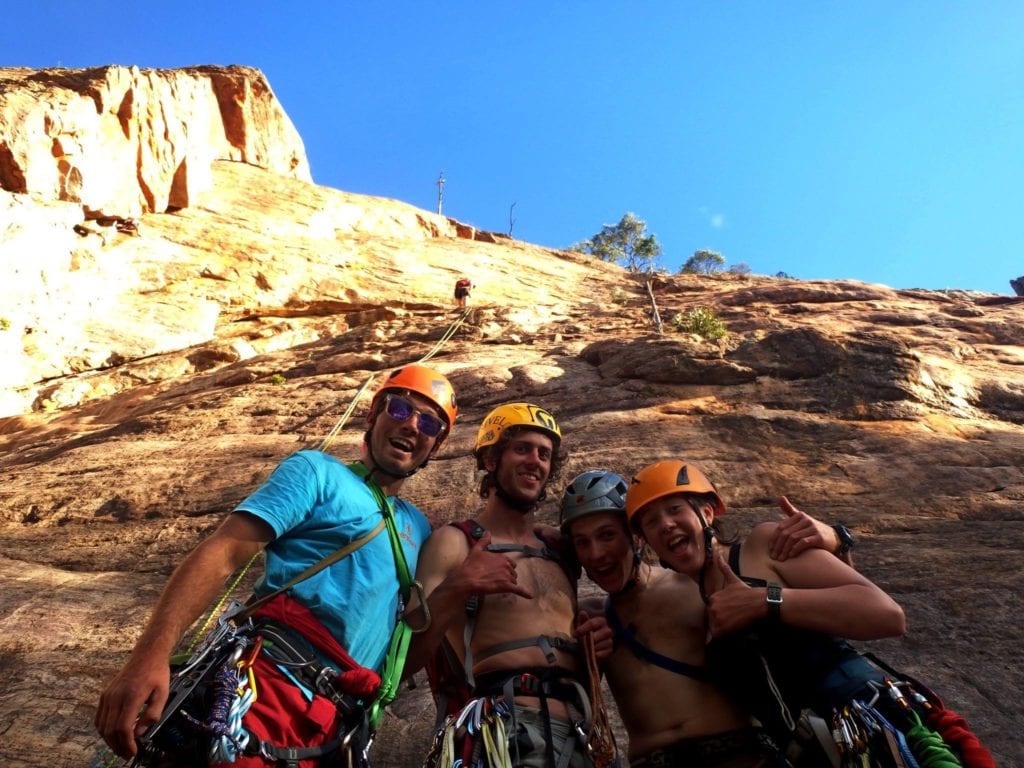
We believe in doing things differently. We are committed to small groups and high guide ratios. the quality of our trips is our driving principle, not the profit margin of faceless shareholders.
A flat fee goes from every booking goes towards conservation projects nation wide and also to local initiatives to reintroduce threatened endemic bird species, the Whio, into the area. That’s money from your pocket going back into creating a better environment than the one you encountered. We think that’s pretty amazing!
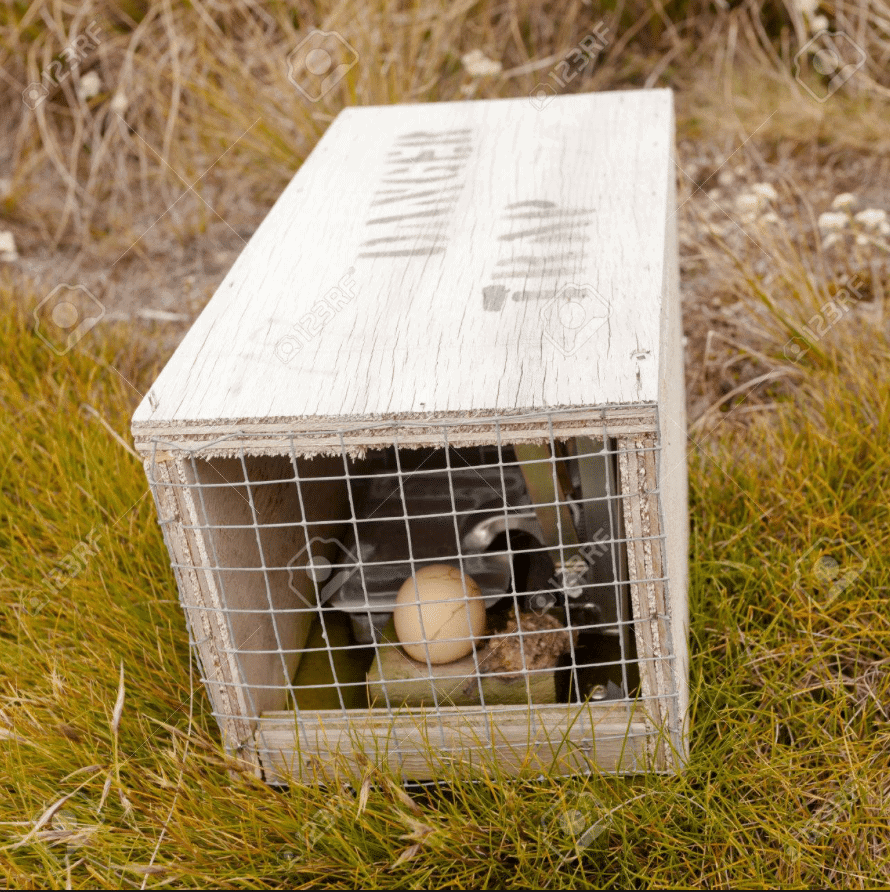
We use local supplier with real names, back stories and families. Our food is locally sourced, we use local drivers, agents, guides, accountants, lawyers, web developers, marketing personnel, photographers and web partners. We support small businesses and local enterprises. You’ll not see us sourcing our creative labour from websites that encourage gig culture for the lowest bid. We pay our hard working, qualified, experienced and talented crew a living wage and proudly support and sponsor teams within the adventure community and charitable causes. We strive to create virtuous circles with local communities and agencies to incentivise, protect and conserve these amazing places that attract our incredible guests (that’s you guys!) in the first place.

In 2020 our guides removed thousands of wilding pines from the Wakatipu basin and in 2021 we extended and intensified the trap lines that your hard earned cash helped to put in and monitor.
In 2020 we also made a commitment towards more sustainable resources and ways to lessen the impact on the climate that our outdoor gear has. To this end we began upgrading and repairing boats for our customers to try and prolong the life of their gear and our latest effort will see us selling packrafts that we bring in using a consignment model. By bringing packrafts into NZ in larger consignments, we are reducing the number of flights needed to bring our much loved packrafts to NZ. This significantly lowers our carbon footprint.
As part of retail drive we have partnered up with local gear suppliers where possible too, in some cases helping these small business to actually expand their operation and become more sustainable themselves. Much as we love our partners overseas, it has never been more important to support local businesses and this has meant innovating and collaborating with talented small manufacturers in the Wakatipu and in the North Island where possible.
Our guides are also heavily involved with community projects such as Search and Rescue, to the extend where our guides are asked to train teams from around NZ.
In a period of time where Tourism businesses are being asked to reinvent themselves and come up with more sustainable way of running, we’re thrilled to see more businesses adapting the business models that we’ve been passionate about since our conception. We’re like the hipsters of sustainable and regenerative tourism, enthusiastic about our responsibilities to our communities and environments since waaaaaay back!
Brilliant product in an stunning landscape
Brilliant product in an stunning landscape – and I’m just talking about the picnic! I really enjoyed my day in the Rees valley and can’t think of a better way of exploring it than the beautiful two hour hike along the valley followed by kayaking down the crystal waters. Our guide, Huw was kind, funny, interesting and a pleasure to be around. I can’t reckoned the full day trip enough!

IMAGES
COMMENTS
Queenstown Lakes' destination management plan, Travel to a thriving future, aims to achieve regenerative tourism and a carbon zero visitor economy by 2030. This offers opportunities for the region and greater wellbeing for people and the planet as regenerative tourism benefits communities, the environment, and the economy.
The region is on a journey to regenerative tourism. We're aiming for a carbon zero visitor economy by 2030. Our goal to change the way people travel for good in becoming a regenerative destination by 2030 is a world first - luckily we have so many locals passionate about sustainability. ... Regenerative Tourism by 2030; Queenstown's ...
Australian cities are lagging far behind New Zealand's Queenstown when it comes to ambitious carbon-zero plans. ... but this is a regenerative tourism strategy that we feel will protect the ...
The Queenstown Lakes District Council has endorsed plans to become a carbon zero visitor economy by 2030. The destination management plan offers a roadmap to regenerative tourism and is a collaboration involving Destination Queenstown, Lake Wanaka Tourism and the council. While tourism contributed 21 percent to the district's GDP in 2021, it ...
Destination Management Planning. The pandemic has created a unique opportunity to rethink the visitor sectors purpose, the principles by which we operate and how we measure success. QLDC has partnered with DQ and Lake Wanaka Tourism to develop a destination management plan for the district - Regenerative tourism by 2030.
prerequisite for regenerative tourism, and Queenstown Lakes cannot afford to wait. As the world wakes up to the urgency ofclimatedestabilisation, thetourism system in Queenstown Lakes can begin its journey to regeneration by accelerating this district's decarbonisation. Achieving this ambitious objective will require action on day one. The ...
Friday, 25 March 2022. The Queenstown Lakes District Destination Management Plan aims to include regenerative tourism practices by 2030. Lake Wānaka Tourism General Manager Tim Barke gave the first update on the management plan since its inception in 2020 at the University of Otago's Tourism Policy School yesterday.. The plan was introduced as part of the Government's response to how the ...
New tourism strategy revealed. Destination Queenstown is gearing up to launch the first phase of its regenerative tourism strategy by encouraging visitors to contribute towards its carbon zero goals. The tourism organisation said serious progress needed to be made in decarbonising many of the adventure destination's activities, which was an ...
Regenerative tourism plan on drawing board. Three agencies have begun designing a regenerative tourism plan for the Queenstown Lakes district. Destination Queenstown, Lake Wanaka Tourism and the Queenstown Lakes District Council want to work with the community, visitor industry and stakeholders to develop a road map for tourism up to 2030.
regenerative tourism gives back more than it takes. It improves wellbeing and is the best path towards a tourism industry the Queenstown Lakes District can be proud of." - Travel to a thriving future 2023 (Queenstown Lakes regenerative tourism plan). Read more about the Queenstown Lakes' regenerative tourism plan . here.
Work with the local tourism industry, community and stakeholders to co-design a plan for the Queenstown Lakes district which will provide a roadmap for moving the district toward a regenerative tourism future by 2030. Put our local community, visitors, and unique and beautiful district at the heart of the plan.
Tourism For A Better Future: A Regenerative Tourism Plan 07 LACK OF GOOD DATA Effective tourism strategy and management requires useful, consistent data. Otherwise, management of the visitor economy tends to be reactive instead of proactive, as has been an issue in the past. The future of tourism in Queenstown Lakes is bright, but
The pandemic has created a unique opportunity to rethink and evolve the visitor sector so it creates value more broadly for the benefit of our people, our place and collective prosperity.
The Queenstown Lakes region has accepted possibly the most significant challenge and opportunity of our time. It invites visitors and businesses to support the district's goal of a regenerative, carbon-zero visitor economy by 2030. Destination Queenstown chief executive Mat Woods outlined the initiative at MEETINGS 2023 in Wellington.
In this sense, regenerative tourism must rely on models that surpass the notion of capitalism (Mura and Wijesinghe, 2021), and the regenerative economy is a driver of regenerative tourism. Sheldon (2021) states that regenerative tourism, as it is also developed in New Zealand, "represents a comprehensive and mature approach to designing the ...
The Queenstown Lakes District Councillors have officially endorsed the Queenstown Lakes regeneration tourism strategy. As the final step to adopting the region's destination management plan, 'Travel to a Thriving Future,' the strategy partnership includes Destination Queenstown (DQ), Lake Wānaka Tourism (LWT), and the Queenstown Lakes District (QLDC).
We use local suppliers and reduce food miles where possible. In 2020 our guides removed thousands of wilding pines from the Wakatipu basin and in 2021 we extended and intensified the trap lines that your hard earned cash helped to put in and monitor. In 2020 we also made a commitment towards more sustainable resources and ways to lessen the ...